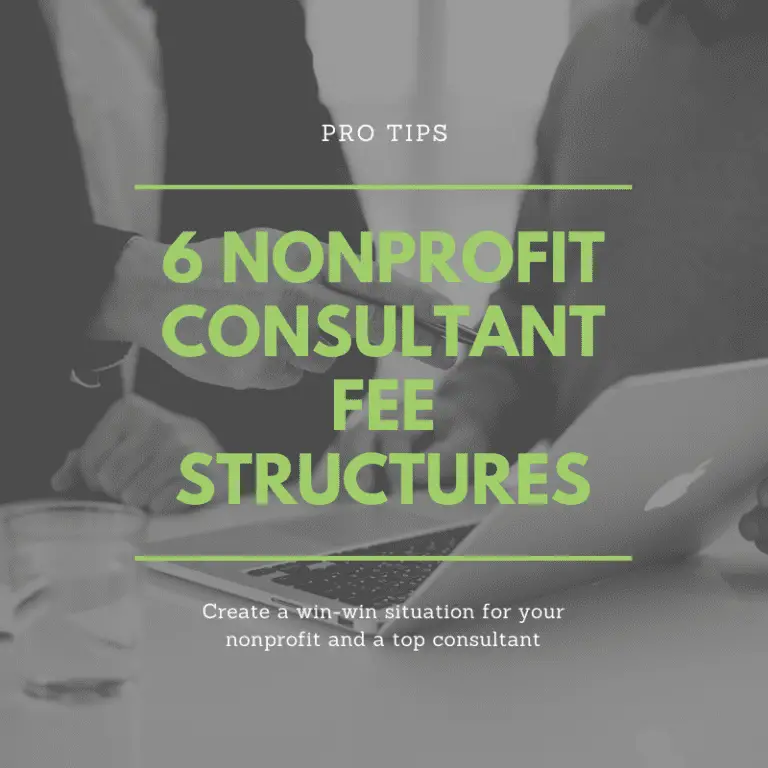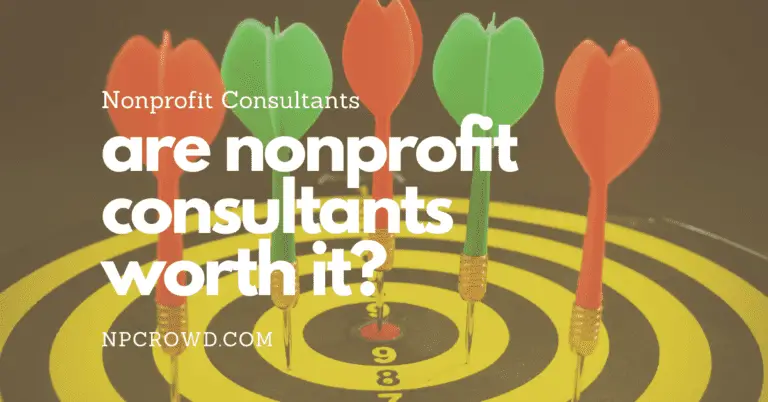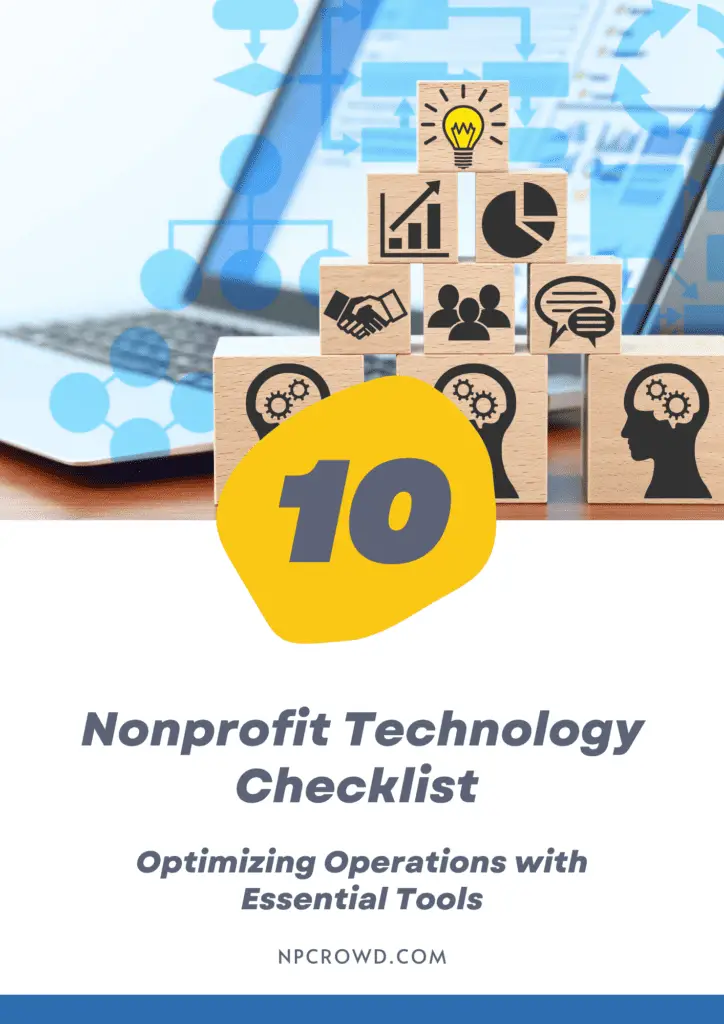The Role of a Nonprofit Strategic Planning Consultant in Achieving Organizational Goals
Disclaimer: This post may contain affiliate links. These links, if used and purchases made, we may earn a small commission. These affiliate programs do not impact the recommendations we make or the resources we refer you to. Our focus is on providing you the best resources for your nonprofit journey.
Nonprofit organizations play a crucial role in addressing social issues and creating positive change in communities. However, achieving their goals requires careful planning and strategic decision-making. This is where nonprofit strategic planning consultants come in. In this article, we will explore the role of a nonprofit strategic planning consultant and how they contribute to the success of nonprofit organizations.Key Takeaways
- Nonprofit strategic planning consultants help organizations develop and implement strategic plans to achieve their goals.
- They conduct comprehensive organizational assessments to identify strengths, weaknesses, and opportunities for growth.
- Consultants facilitate stakeholder engagement to ensure that diverse perspectives are considered in the planning process.
- They have expertise in nonprofit management, governance, fundraising, and evaluation.
- Nonprofit strategic planning consultants face challenges such as navigating complex organizational structures and balancing short-term and long-term goals.
Understanding the Role of a Nonprofit Strategic Planning Consultant

What is a Nonprofit Strategic Planning Consultant?
A nonprofit strategic planning consultant is a professional who specializes in helping nonprofit organizations develop and implement strategic plans. They work closely with nonprofit leaders and stakeholders to assess the organization’s current situation, identify goals and objectives, and create a roadmap for achieving those goals. Their expertise in strategic planning and nonprofit management allows them to provide valuable guidance and support throughout the planning process.
When working with a nonprofit strategic planning consultant, organizations can expect to receive personalized attention and tailored solutions that address their unique needs and challenges. Consultants bring a fresh perspective and objective insights to the table, helping organizations think strategically and make informed decisions. They also facilitate collaboration and engagement among stakeholders, ensuring that everyone’s voice is heard and considered.
Here are a few key reasons why nonprofit organizations choose to enlist the help of a strategic planning consultant:
- Expertise: Strategic planning consultants have specialized knowledge and experience in nonprofit management and governance, allowing them to provide valuable insights and guidance.
- Objectivity: Consultants bring an outside perspective and can offer unbiased advice, helping organizations overcome internal biases and challenges.
- Efficiency: Consultants have the skills and tools to streamline the planning process, saving organizations time and resources.
- Accountability: Working with a consultant helps organizations stay accountable to their goals and ensures that the strategic plan is implemented effectively.
In summary, a nonprofit strategic planning consultant is a valuable partner for nonprofit organizations looking to develop and implement effective strategic plans. Their expertise, objectivity, and ability to facilitate collaboration make them an essential resource for achieving organizational goals.
Why is Strategic Planning Important for Nonprofit Organizations?
Strategic planning is a crucial process for nonprofit organizations as it provides a roadmap for achieving long-term objectives and maximizing impact. It allows nonprofits to align their resources effectively, engage stakeholders, and adapt to a changing environment. By defining the organization’s mission, vision, goals, and strategies, strategic planning ensures that nonprofits stay focused and make informed decisions. It also helps in identifying and addressing challenges and opportunities that may arise along the way.
The Benefits of Hiring a Nonprofit Strategic Planning Consultant
Hiring a nonprofit strategic planning consultant can provide numerous benefits for your organization. Here are a few key advantages:
-
Expertise and Experience: A consultant brings specialized knowledge and experience in nonprofit strategic planning. They have worked with various organizations and can offer valuable insights and best practices.
-
Objective Perspective: Consultants provide an unbiased and objective perspective on your organization’s strengths, weaknesses, opportunities, and threats. They can identify areas for improvement and help you develop a strategic plan that aligns with your goals.
-
Efficiency and Focus: Strategic planning consultants have the expertise to streamline the planning process and keep it focused. They can guide you through each step, ensuring that your resources and efforts are directed towards achieving your organizational goals.
-
Stakeholder Engagement: Consultants facilitate stakeholder engagement, ensuring that all relevant parties are involved in the planning process. This collaborative approach fosters buy-in and increases the likelihood of successful plan implementation.
-
Customized Solutions: A consultant will work closely with your organization to understand its unique needs and challenges. They will develop a strategic plan tailored to your specific goals, mission, and resources.
In summary, hiring a nonprofit strategic planning consultant can bring expertise, objectivity, efficiency, stakeholder engagement, and customized solutions to your organization’s strategic planning process.
Key Responsibilities of a Nonprofit Strategic Planning Consultant

Conducting a Comprehensive Organizational Assessment
When working as a nonprofit strategic planning consultant, one of the key responsibilities is conducting a comprehensive organizational assessment. This assessment involves evaluating various aspects of the organization, such as its mission, goals, programs, operations, and resources. By conducting a thorough assessment, consultants can gain a deep understanding of the organization’s strengths, weaknesses, opportunities, and threats.
To conduct an organizational assessment, consultants may use a combination of qualitative and quantitative methods. This can include reviewing documents and data, conducting interviews and surveys, and observing organizational processes. The goal is to gather information that will inform the development of a strategic plan.
Here are some key steps involved in conducting a comprehensive organizational assessment:
- Reviewing the organization’s mission, vision, and values to ensure alignment with its goals and objectives.
- Analyzing the organization’s internal and external environment, including factors such as competition, funding sources, and regulatory requirements.
- Assessing the organization’s programs and services to determine their effectiveness and impact.
- Evaluating the organization’s financial health and sustainability.
- Identifying the organization’s strengths, weaknesses, opportunities, and threats.
It is important for consultants to approach the assessment process with objectivity and sensitivity. They should create a safe and inclusive space for stakeholders to share their perspectives and concerns. By conducting a comprehensive organizational assessment, consultants can lay the foundation for developing a strategic plan that addresses the organization’s unique needs and challenges.
Facilitating Stakeholder Engagement
When it comes to strategic planning for nonprofit organizations, one of the key steps is facilitating stakeholder engagement. This involves having conversations with key stakeholders to hear their external perspectives and understand their needs and expectations. By involving all important stakeholders in the process, including staff, board members, volunteers, funders, and partners, you can ensure that the strategic plan addresses current and emerging needs, as well as known and unplanned barriers.
To facilitate stakeholder engagement effectively, it is important to take an inclusive approach. While not all voices will be weighted equally or involved at every stage, it is crucial to give everyone a voice and consider their input. This inclusive approach helps create a valuable strategic plan that reflects the diverse perspectives and interests of the stakeholders.
In addition to inclusive engagement, data should also be used to inform the decision-making process. By gathering and analyzing relevant data, such as organizational performance metrics, community demographics, and industry trends, you can make more informed decisions and develop strategies that are grounded in evidence.
Here are some tips for facilitating stakeholder engagement:
- Conduct interviews or surveys to gather input from stakeholders
- Organize focus groups or workshops to foster collaboration
- Use data visualization tools to present information in a clear and accessible way
- Provide regular updates and opportunities for feedback throughout the planning process
Remember, the process of facilitating stakeholder engagement is just as important as the resulting strategic plan. By involving stakeholders and using data, you can create a plan that truly reflects the needs and aspirations of your organization and its stakeholders.
Developing a Strategic Plan
Developing a strategic plan is a crucial step in the nonprofit strategic planning process. It involves creating a roadmap that outlines the organization’s goals and strategies for achieving them. Thorough research and analysis are essential during this phase to ensure that the plan is based on a deep understanding of the organization’s internal strengths and weaknesses, as well as external opportunities and challenges.
Once the research is complete, the next step is to engage key stakeholders in the planning process. This can be done through surveys, interviews, or facilitated workshops to gather input and perspectives from individuals who have a vested interest in the organization’s success.
After gathering input from stakeholders, the nonprofit strategic planning consultant will work with the organization’s leadership team to develop goals and strategies that align with the organization’s mission and vision. These goals and strategies should be specific, measurable, achievable, relevant, and time-bound (SMART) to ensure they are actionable and effective.
To effectively implement the strategic plan, it is important to build flexibility into the plan. This allows the organization to adapt and respond to changing circumstances and emerging opportunities. Regular communication and transparency are also crucial during the implementation phase. Sharing the strategic plan with stakeholders helps build trust and accountability, while regular progress updates keep everyone informed and engaged.
Lastly, it is important to regularly review and refresh the strategic plan to ensure it remains aligned with the organization’s mission, vision, and the evolving external landscape. Strategic planning is an ongoing process, and it is important to continuously evaluate and adjust the plan as needed to ensure its effectiveness and relevance.
Remember, the process of creating the strategic plan is just as important as the plan itself. It is a collaborative effort that requires in-depth research, stakeholder engagement, and ongoing communication. By investing time and effort into the planning process, nonprofit organizations can set themselves up for success and make a lasting impact in their communities.
Implementing and Monitoring the Strategic Plan
Once the strategic plan has been developed, it is crucial to effectively implement and monitor its progress. Here are some key steps to ensure successful implementation and monitoring:
-
Put your strategic plan into action: Engage staff, volunteers, and board members to work collaboratively towards achieving the objectives outlined in the plan.
-
Regularly review and refresh your plan: As mentioned earlier, it is important to regularly review and refresh your plan to ensure it remains aligned with your mission, vision, and the evolving landscape.
-
Monitor and evaluate: Regularly monitor and evaluate your nonprofit’s activities against the benchmarks set in the strategic plan. This will help you make data-driven adjustments and ensure progress towards your goals.
-
Communicate progress and updates: Share your strategic plan with stakeholders to build trust and accountability. Regularly communicate progress and updates to keep everyone informed and engaged.
-
Be flexible and adaptable: Recognize that plans may need to change due to unforeseen circumstances or opportunities. Build flexibility into your plan to adapt as needed.
Remember, successful implementation and monitoring of the strategic plan are essential for achieving organizational goals and driving positive change.
Skills and Qualifications of a Nonprofit Strategic Planning Consultant

Expertise in Nonprofit Management and Governance
Having expertise in nonprofit management and governance is essential for a nonprofit strategic planning consultant. It requires a deep understanding of the unique challenges and dynamics of the nonprofit sector. Navigating complex organizational structures is one aspect where expertise comes into play. Nonprofit organizations often have intricate hierarchies and decision-making processes, and a consultant needs to be able to navigate these complexities to effectively guide the strategic planning process.
Another important aspect of expertise is managing stakeholder expectations. Nonprofit organizations have diverse stakeholders, including board members, staff, volunteers, donors, and community members. Each stakeholder group may have different expectations and priorities, and a consultant needs to have the skills to engage and align these stakeholders towards a common strategic vision.
Adapting to changing external factors is also crucial for a consultant with expertise in nonprofit management and governance. The nonprofit sector is constantly evolving, with new regulations, funding opportunities, and societal trends. A consultant needs to stay updated on these changes and be able to adapt the strategic plan accordingly.
Finally, balancing short-term and long-term goals is a key responsibility. Nonprofit organizations often have immediate needs and pressing challenges that require attention, but it’s also important to have a long-term vision and plan for sustainable growth. A consultant with expertise in nonprofit management and governance can help strike the right balance between short-term and long-term goals, ensuring that the strategic plan addresses both immediate and future needs.
Strong Analytical and Problem-Solving Skills
A nonprofit strategic planning consultant with strong analytical and problem-solving skills is an invaluable asset to any organization. These skills allow consultants to effectively assess complex situations, identify key issues, and develop strategic solutions. By analyzing data, conducting research, and applying critical thinking, consultants can uncover insights and opportunities that may not be immediately apparent. This enables them to make informed recommendations and guide organizations towards achieving their goals.
In addition to their analytical abilities, consultants with strong problem-solving skills can navigate challenges and obstacles with ease. They are adept at breaking down complex problems into manageable components and developing practical solutions. Their ability to think creatively and adapt to changing circumstances allows them to address issues in a proactive and efficient manner.
To illustrate the importance of strong analytical and problem-solving skills, consider the following examples:
Effective Communication and Facilitation Abilities
It is important to focus on effective communication. Consultants who can articulate their ideas clearly and concisely demonstrate their ability to convey complex information to stakeholders. Additionally, addressing any concerns or uncertainties you may have will help you gain a better understanding of how they approach potential challenges. Timely follow-up is another crucial aspect to consider. Look for consultants who promptly respond to your inquiries and demonstrate their commitment to open and transparent communication. This responsiveness is indicative of their dedication and professionalism, fundamental qualities that contribute to a successful working relationship.
Understanding of Fundraising and Resource Development
Fundraising and resource development are crucial for the sustainability and growth of nonprofit organizations. As a nonprofit strategic planning consultant, I have extensive experience in helping organizations navigate the complexities of fundraising and resource development. Maximizing the potential of your organization requires a strategic approach that takes into account the unique needs and challenges of your organization. By leveraging my expertise, I can assist you in developing a comprehensive fundraising and resource development plan that aligns with your organizational goals and values.
When it comes to fundraising and resource development, it’s important to consider a variety of strategies and tactics. Here are some key areas where I can provide guidance and support:
- Donor Cultivation: Building strong relationships with donors is essential for long-term sustainability. I can help you develop strategies for donor cultivation, including stewardship programs and personalized communication.
- Grant Writing: Securing grants can provide a significant boost to your organization’s funding. I have experience in grant writing and can assist you in identifying potential grant opportunities and crafting compelling proposals.
- Corporate Partnerships: Collaborating with businesses can be a valuable source of funding and resources. I can help you identify and approach potential corporate partners and develop mutually beneficial partnerships.
In addition to these strategies, I also emphasize the importance of diversifying your funding sources. Relying on a single source of funding can be risky, so I can work with you to explore alternative revenue streams and develop a sustainable funding model.
Remember, fundraising and resource development is an ongoing process that requires continuous effort and adaptation. As a nonprofit strategic planning consultant, I can provide ongoing support and guidance to ensure that your organization’s fundraising efforts are effective and sustainable.
Knowledge of Evaluation and Impact Measurement
Evaluation and impact measurement are essential components of nonprofit strategic planning. Evaluation allows organizations to assess the effectiveness and efficiency of their programs and initiatives, while impact measurement helps determine the long-term outcomes and social change created by these efforts.
To effectively evaluate and measure impact, nonprofit strategic planning consultants should:
- Develop clear evaluation frameworks and methodologies that align with the organization’s goals and objectives.
- Collect and analyze relevant data to assess program outcomes and identify areas for improvement.
- Engage stakeholders in the evaluation process to ensure diverse perspectives and insights.
- Use evaluation findings to inform decision-making and drive continuous improvement.
Tip: When selecting a nonprofit strategic planning consultant, consider their experience and expertise in evaluation and impact measurement. Look for consultants who have a track record of using data-driven approaches to inform strategic decision-making and enhance program effectiveness.
Challenges Faced by Nonprofit Strategic Planning Consultants

Navigating Complex Organizational Structures
Navigating complex organizational structures can be a challenging task for nonprofit strategic planning consultants. With multiple departments and diverse stakeholders, it’s important to have a clear understanding of the organization’s structure and how it functions. Effective communication and collaboration are key in navigating these complexities.
One approach that can be helpful is to establish sub-committees that are mission-aligned, enabling board members to connect over shared organizational goals. However, it’s important to ensure that board members understand their role on these committees is to provide oversight, not to engage in operations.
Another strategy is to consider annual board retreats that focus not just on strategic planning but also on trust-building activities. These retreats provide an opportunity for board members to come together in a relaxed setting and strengthen their relationships.
Additionally, mentoring can play a valuable role in navigating complex organizational structures. Pairing new board members with seasoned veterans allows for mutual learning and relationship building, helping new members understand the dynamics of the organization and their role within it.
Overall, navigating complex organizational structures requires a combination of communication, collaboration, and relationship building. By utilizing these strategies, nonprofit strategic planning consultants can effectively navigate the complexities and help organizations achieve their goals.
Managing Stakeholder Expectations
Managing stakeholder expectations is a critical aspect of the nonprofit strategic planning process. When embarking on strategic planning, it is important to engage with key stakeholders to ensure their perspectives are heard and considered. This inclusive approach allows for a valuable strategic plan that addresses current and emerging needs, as well as known and unplanned barriers. Additionally, using data to inform decision-making provides a solid foundation for setting goals and expectations. By aligning on the objectives, deliverables, and desired outcomes, nonprofit organizations can establish a successful partnership with a strategic planning consultant. Clear communication and a well-defined hiring process are essential in ensuring a smooth and effective consultant selection process. This increases the likelihood of finding the right consultant who can meet the organization’s needs and help manage stakeholder expectations.
Adapting to Changing External Factors
Nonprofit strategic planning consultants must be adaptable and responsive to changing external factors that may impact the organization’s goals and strategies. In today’s dynamic and unpredictable environment, nonprofits face various challenges and uncertainties, such as economic uncertainty, potential funding cuts, and competition from other organizations with similar missions. To navigate these challenges, consultants need to stay informed about the external landscape and continuously assess the potential impact on the organization. They should also be proactive in identifying emerging opportunities and potential threats.
Balancing Short-Term and Long-Term Goals
When working as a nonprofit strategic planning consultant, one of the key challenges is finding the right balance between short-term and long-term goals. It’s important to address the immediate needs and priorities of the organization while also keeping sight of the long-term vision and impact. Striking this balance requires careful consideration and strategic decision-making.
One approach to balancing short-term and long-term goals is to prioritize initiatives that have both immediate and long-lasting benefits. This could involve identifying quick wins that can generate momentum and support for the organization, while also investing in initiatives that contribute to long-term sustainability and growth.
Another strategy is to align short-term actions with long-term objectives. By ensuring that the day-to-day activities and projects are in line with the overall strategic direction, the organization can make progress towards its long-term goals while addressing immediate needs.
It’s also important to communicate the importance of balancing short-term and long-term goals to stakeholders. By explaining the rationale behind strategic decisions and the potential impact on both immediate and future outcomes, you can gain buy-in and support for the organization’s approach.
Ultimately, finding the right balance between short-term and long-term goals requires a combination of flexibility and foresight. It’s about being responsive to the current environment and needs, while also keeping an eye on the bigger picture and long-term vision of the organization.
Best Practices for Nonprofit Strategic Planning Consultants

Building Strong Relationships with Nonprofit Leaders
Building strong relationships with nonprofit leaders is essential for the success of a nonprofit strategic planning consultant. Trust and open communication are the foundation of these relationships, allowing consultants to gain a deep understanding of the organization’s goals, challenges, and culture. By establishing a strong rapport, consultants can effectively collaborate with nonprofit leaders to develop and implement strategic plans that align with the organization’s mission and vision.
To build strong relationships with nonprofit leaders, consultants should:
- Listen actively to leaders’ perspectives and concerns, demonstrating empathy and respect.
- Provide guidance based on their expertise and experience, offering valuable insights and recommendations.
- Collaborate with leaders in decision-making processes, fostering a sense of ownership and commitment.
- Communicate transparently about progress, challenges, and opportunities, ensuring that leaders are informed and involved throughout the strategic planning process.
Remember, building strong relationships with nonprofit leaders is not just about the work; it is about creating a community where everyone is invested in the organization’s success.
Engaging Diverse Stakeholders
Engaging diverse stakeholders is a crucial aspect of nonprofit strategic planning. By involving a wide range of individuals and groups, you can gain valuable insights and perspectives that will contribute to the development of a comprehensive and effective strategic plan. In an inclusive approach, all important stakeholders, including staff, board members, volunteers, funders, and partners, have a voice in the process. While not all voices will be weighted equally or involved at every stage, it is important to recognize that they all play a significant role in creating a valuable strategic plan.
To ensure that the strategic planning process is informed by data and research, it is important to use quantitative and qualitative information. This can include data on the organization’s current performance, external trends and challenges, and the needs and preferences of stakeholders. By using data, you can make more informed decisions and develop strategies that are grounded in evidence.
In addition to data, it is also important to consider the unique perspectives and experiences of diverse stakeholders. This can be done through conversations, interviews, surveys, and focus groups. By actively seeking input from different groups, you can ensure that the strategic plan reflects the needs and aspirations of the entire organization.
Key Highlight: valuable strategic plan that addresses current and emerging needs
Using Data and Research to Inform Decision-Making
Data and research play a crucial role in the strategic planning process for nonprofit organizations. By analyzing and utilizing the information gleaned from pre-planning research, consultants can guide the board in identifying focused and specific strategic goals. This ensures that the strategic plan addresses current and emerging needs, as well as known and unplanned barriers. Data provides the foundation for focused decision-making, allowing organizations to make informed choices based on evidence rather than assumptions.
In addition to using data, it is important to take an inclusive approach when involving stakeholders in the strategic planning process. This includes staff, board members, volunteers, funders, partners, and other important stakeholders. While not all voices will be weighted equally or involved at every stage, it is important to consider the perspectives and insights of all stakeholders. This inclusive approach helps to ensure that the strategic plan reflects the diverse needs and priorities of the organization.
To effectively use data and research in the strategic planning process, nonprofit strategic planning consultants can follow best practices such as conducting a comprehensive organizational assessment, engaging diverse stakeholders, and using data to inform decision-making. By combining expertise in data analysis with a collaborative approach, consultants can help organizations develop strategic plans that are grounded in evidence and aligned with their goals and mission.
Key Points:
- Data and research provide the foundation for focused decision-making in strategic planning.
- Inclusive stakeholder engagement ensures that the strategic plan reflects diverse perspectives.
- Nonprofit strategic planning consultants can use data to inform decision-making and guide the development of strategic goals.
- Best practices include conducting an organizational assessment, engaging diverse stakeholders, and using data to inform decision-making.
Creating Realistic and Actionable Strategic Plans
Creating realistic and actionable strategic plans is a crucial aspect of the nonprofit strategic planning process. It involves aligning organizational goals with practical and achievable strategies. To ensure the effectiveness of the strategic plan, it’s essential to consider the following key elements:
- Flexibility: Build flexibility into the plan to adapt to changing external factors and emerging opportunities.
- Communication and Transparency: Share the strategic plan with stakeholders to foster trust and accountability. Regularly communicate progress and updates to keep everyone informed and engaged.
- Implementation: Put the strategic plan into action by fostering collaboration among staff, volunteers, and board members to achieve the outlined objectives.
- Review and Refresh: Regularly review and refresh the plan to ensure alignment with the organization’s mission, vision, and evolving needs.
Remember, creating a strategic plan is a comprehensive process that requires time, effort, and collaboration. It’s not just about the final document; it’s about the journey of exploration, discussion, and learning that can profoundly impact the organization’s trajectory.
Providing Ongoing Support and Evaluation
After developing and implementing a strategic plan, it is crucial for nonprofit organizations to provide ongoing support and evaluation to ensure the plan’s success. This involves several key steps:
Frequently Asked Questions
What is the role of a nonprofit strategic planning consultant?
A nonprofit strategic planning consultant helps nonprofit organizations develop and implement strategic plans to achieve their organizational goals. They provide expertise in nonprofit management, governance, and fundraising, and help organizations navigate complex organizational structures and stakeholder expectations.
Why is strategic planning important for nonprofit organizations?
Strategic planning is important for nonprofit organizations because it helps them define their mission, vision, and goals, and provides a roadmap for achieving those goals. It allows organizations to align their resources and activities, make informed decisions, and adapt to changing external factors.
What are the benefits of hiring a nonprofit strategic planning consultant?
Hiring a nonprofit strategic planning consultant brings several benefits. They bring expertise and experience in nonprofit strategic planning, facilitate stakeholder engagement, provide an objective perspective, and ensure the strategic planning process is comprehensive and effective.
What are the key responsibilities of a nonprofit strategic planning consultant?
The key responsibilities of a nonprofit strategic planning consultant include conducting a comprehensive organizational assessment, facilitating stakeholder engagement, developing a strategic plan, and implementing and monitoring the strategic plan.
What skills and qualifications should a nonprofit strategic planning consultant have?
A nonprofit strategic planning consultant should have expertise in nonprofit management and governance, strong analytical and problem-solving skills, effective communication and facilitation abilities, understanding of fundraising and resource development, and knowledge of evaluation and impact measurement.
What are the challenges faced by nonprofit strategic planning consultants?
Nonprofit strategic planning consultants face challenges such as navigating complex organizational structures, managing stakeholder expectations, adapting to changing external factors, and balancing short-term and long-term goals.







